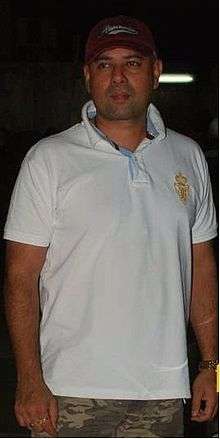Atul Agnihotri
| Atul Agnihotri | |
|---|---|
 | |
| Born |
Atul Agnihotri 8 July 1970 Delhi, India[1] |
| Nationality | Indian |
| Occupation | Producer, director, actor |
| Years active | 1983, 1993–present |
| Spouse(s) | Alvira Khan Agnihotri (m. 1996)[1] |
| Children |
Alizeh Agnihotri Ayaan Agnihotri |
Atul Agnihotri is an Indian film actor, producer, and director.[2] He started his Bollywood career as an actor, went on to direct two films, and found success as a film producer.
Early and personal life
Agnihotri was born into a Punjabi family,[1] the son of Rohit Agnihotri, an actor of yesteryears who quit films after a brief stint and later tried his hand at business.[1] Agnihotri lost his father at a very young age and the responsibility of supporting his family came upon him.[1] Agnihotri's first cousin is actress Rati Agnihotri, who lived with them in Mumbai for two years and made her entry into films during that time; essentially, this inspired Atul to join films likewise.[1]
Agnihotri is married to Alvira Khan, who is the daughter of scriptwriter Salim Khan and sister of actors Salman Khan, Arbaaz Khan and Sohail Khan.[3] They have two children - a son Ayaan and a daughter Alizeh.[4]
Career
Acting
Agnihotri's career stretches back to 1983 when he made a brief appearance as a child artist in Pasand Apni Apni (1983) in which his cousin Rati Agnihotri was the heroine.[1] Inspired by her success, and by the memory of his father's dreams and brief stint as an actor, Agnihotri made the necessary efforts and finally entered the film industry in an acting role. He made his debut with Mahesh Bhatt's Sir (1993), which emerged as a commercial and critical success.[5] He went on to act in several other films throughout the 1990s and early 2000s with his most notable hits being Krantiveer (1994), Naaraz (1994), Aatish (1994), Chachi 420 (1997), Yeshwant (1997), and Hum Tumhare Hain Sanam (2002).[6][7] However, his success as an actor slowly petered out, mainly because he accepted several roles for reasons of money (he had a support his family single-handedly) rather than with proper thought towards strategy.
Direction
After failing to become a lead actor and being restricted to supporting and second lead roles, he made his directorial debut with the 2004 film Dil Ne Jise Apna Kahaa which starred his brother-in-law Salman Khan, Bhoomika Chawla, and Preity Zinta in lead roles.[2]
In 2007 he started work on his second directorial film Hello which starred his brother-in-law Sohail Khan, Isha Koppikar and Sharman Joshi and was released on 10 October 2008.[8]
Production
In 2011, he produced Bodyguard which starred his brother-in-law Salman Khan and Kareena Kapoor. The film proved to be a phenomenal success and made it to the list of all-time Bollywood blockbusters. In 2014, he produced O Teri, starring Pulkit Samrat and Sarah Jane Dias, and directed by debutant Umesh Bhisht.[9]
Filmography
As actor
- Champak Lal ki Shaadi (1983)
- Pasand Apni Apni (1983)
- Sir (1993) – Karan
- Aasoo Bane Angaarey (1993) - Chanda's Brother
- Aatish (1994) – Avi (Baba's Brother)
- Krantiveer (1994) – Atul
- Naaraaz (1994)
- Gunhegar (1995)
- Veergati (1995) – Shlok
- Yeshwant (1997)- John
- Bambai Ka Babu (1996) – Amit
- Jeevan Yudh (1997)
- Chachi 420 (1997)
- Khote Sikkey (1998)
- Yeh Aashiqui Meri (1998) - Shekhar Choudhry
- Hote Hote Pyaar Ho Gaya (1999) – Atul (Bunty)
- Hum Tumhare Hain Sanam (2002) – Prashant
- Jaani Dushman: Ek Anokhi Kahani (2002) – Man driving red car.
- Sanam Teri Kasam (2009) – Gopal
Director
- Dil Ne Jise Apna Kahaa (2004)
- Hello (2008)
Producer
References
- 1 2 3 4 5 6 7 Gupta, Priya (12 March 2014). "Salim uncle replaced my father: Atul Agnihotri". The Times of India. Retrieved 2016-08-10.
- 1 2 "Atul Agnihotri hopes to make a mark as a sensitive director". The Hindu. 23 September 2004. Retrieved 3 April 2009.
- ↑ Biswadeep Ghosh (2004). Hall of fame, Salman Khan. Magna Books. p. 31. ISBN 978-81-7809-249-2.
- ↑ "ABOUT ATUL AGNIHOTRI". Oneindia. Retrieved 3 April 2009.
- ↑ "'May be I am a bit spoilt'". Indian Express. 16 November 1999. Archived from the original on 28 August 2009. Retrieved 3 April 2009.
- ↑ Vickey Lalwani (17 May 2003). "No, says Salman to Manjrekar". rediff.com. Retrieved 3 April 2009.
- ↑ Anita Bora (24 May 2002). "Two's company, three's jealousy". rediff.com. Retrieved 3 April 2009.
- ↑ "'Hello' is Atul Agnihotri's take on call centre life". Sindh Today. 6 October 2008. Archived from the original on 9 October 2008. Retrieved 3 April 2009.
- ↑ "Salman Khan to do a cameo in Atul Agnihotri's next". India Today. 4 June 2013. Retrieved 1 July 2013.